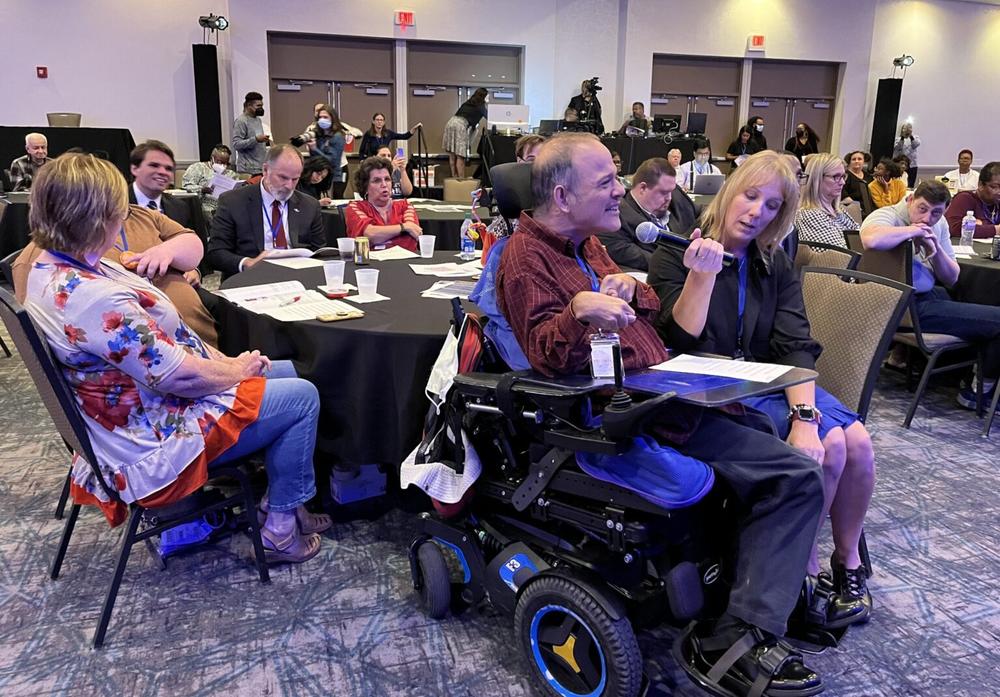
Caption
Carmine Vera, a Lawrenceville resident, asks a question for Georgia labor commissioner candidates at a recent forum focused on issues important to voters with disabilities.
Credit: Jill Nolin/Georgia Recorder

Carmine Vera, a Lawrenceville resident, asks a question for Georgia labor commissioner candidates at a recent forum focused on issues important to voters with disabilities.
As he spoke into the microphone, Carmine Vera posed a question that may be unusual at any other candidate forum: What is your position on the practice of paying people like him below minimum wage?
Vera elevated an issue that is on the mind of many people with disabilities ahead of Georgia’s closely watched midterm elections. Some states block companies from seeking federal approval to pay workers with disabilities rates below the minimum wage, but Georgia is not one of them.
“I plan to vote, and my voice needs to be heard,” the Lawrenceville resident said after the candidate forum wrapped up Thursday evening at a Decatur conference center.
Others, like Susan Burch of Atlanta, offered a few words of advice to her peers that will resonate with all voters.
“Make sure you’re voting for who you want, not for somebody telling you who they think you should vote for but who you want,” Burch said to applause.
The event was put on by groups like the Georgia Council on Developmental Disabilities with the goal of both highlighting the electoral clout of people with disabilities and encouraging this community to speak up and be heard in the political space.
Georgia doesn’t track how many registered voters have disabilities, but nationally, the community represents about 20 million voters.
The opportunity to engage with people with disabilities just weeks before early voting starts yielded mixed results from Georgia’s candidates for statewide office.
Most of the participating candidates submitted a video response to questions that were played during the event, held both virtually and in person.
A few, including Republican incumbent state Superintendent Richard Woods, Democratic insurance commissioner candidate Janice Laws Robinson and Libertarian labor commissioner candidate Emily Anderson, were the only candidates in their race to show up in person to answer questions.
A couple of the highest-profile video responses noticeably skirted the questions asked.
When asked about the unemployment rate and wait list for services for people with disabilities, Republican Gov. Brian Kemp sent a video update about Hurricane Ian. His opponent, Democrat Stacey Abrams, staked out policy positions, including how she would address the 7,000 people waiting for home and community-based services through Medicaid.
“The state of Georgia can currently afford to not only reduce but eliminate the waitlist by investing $35 million per year,” Abrams said. “And because we have a $6.6 billion surplus, we have funds to not only tackle the problem now but to invest for the future.”
Herschel Walker, the Republican candidate for the U.S. Senate, offered a nine-second clip filmed on his campaign bus when asked about companies paying subminimum wage and the shortage of direct service professionals who help people with disabilities with daily tasks. That workforce shortage has made it challenging for people to find help even when they come off the waitlist and receive waiver services.
“Hi, this is Herschel Walker. I want everyone to know I will always be a champion for anyone in the disabled, disability community. God bless,” Walker said.
U.S. Sen. Raphael Warnock, a Democrat, didn’t delve into the details but offered his support for improving wages and was rewarded with applause from the crowd.
“What kind of country are we if we don’t do all we can to ensure Georgians with disabilities can not only access a job but get paid fair wages for a day’s work? That is not a country that honors the dignity of work,” Warnock said in a captioned video.
Philip Woody, a Dunwoody resident who quizzed the Senate candidates on behalf of his son Evan, didn’t hide his disappointment over Kemp and Walker’s unresponsive statements, which he described as part of a pattern.
“I’m a conservative and I’m just really disappointed that our party is just not paying attention to those who need it the most,” Woody said.
Charlie Miller, the legislative advocacy director for the Georgia Council on Developmental Disabilities, acknowledged that some candidate responses were more detailed and thoughtful than others, but he still sees progress in all the responses.
“We would love more concrete answers to our questions, yes,” Miller said. “But just purely having them acknowledge the disability community, it’s a step in the right direction. I’m not saying it’s the final step, but it’s a step.”
Miller said the candidate forum is an important event for the community that is meant to empower this often-overlooked segment of the state’s electorate.
“We said no matter what happens, even if no candidate shows up, no one sends a video, we’re still going to have it, we will still have it virtually and in-person to really show the candidates that our voice matters in the state of Georgia and in their elections,” Miller said.
A replay of the forum can be viewed on the council’s Facebook page.
This story comes to GPB through a reporting partnership with Georgia Recorder.